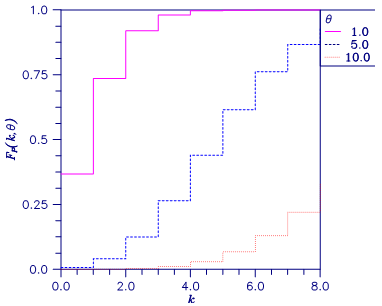poissonCdf¶
Evaluates the Poisson distribution function.
Synopsis¶
poissonCdf (k, theta)
Required Arguments¶
- int
k(Input) - Argument for which the Poisson distribution function is to be evaluated.
- float
theta(Input) - Mean of the Poisson distribution. Argument
thetamust be positive.
Return Value¶
The probability that a Poisson random variable takes a value less than or
equal to k.
Description¶
Function poissonCdf evaluates the distribution function of a Poisson
random variable with parameter theta. The mean of the Poisson random
variable, theta, must be positive. The probability function (with θ =
theta) is as follows:
\[f(x|\theta) = e^{-\theta} \theta^x / x!,
\phantom{...} \text{for } x = 0,1,2,\ldots\]
The individual terms are calculated from the tails of the distribution to
the mode of the distribution and summed. Function poissonCdf uses the
recursive relationship
\[f(x+1|\theta) = f(x|\theta)(\theta/(x+1))
\phantom{...} \text{for } x = 0,1,2,\ldots,k-1\]
with \(f(0)=e^{-q}\).

Figure 11.1 — Plot of Fp (k, θ)
Example¶
Suppose X is a Poisson random variable with \(\theta=10\). In this example, we evaluate the probability that X is less than or equal to 7.
from __future__ import print_function
from numpy import *
from pyimsl.stat.poissonCdf import poissonCdf
k = 7
theta = 10.0
pr = poissonCdf(k, theta)
print("Pr(x <= 7) = %6.4f" % pr)
Output¶
Pr(x <= 7) = 0.2202
Informational Errors¶
IMSLS_LESS_THAN_ZERO |
Since “k” = # is less than zero,
the distribution function is set to zero. |